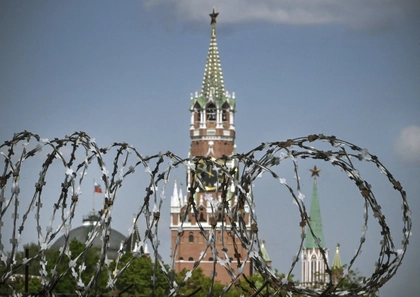Warsaw, Poland, June 26, evening hours. A crowd of several hundred people gathered at the Nicolaus Copernicus monument near the Polish Academy of Sciences on the Royal Route. Many held white-red-white flags and covered their faces. At one point, the crowd began chanting, “Верым, можам, пераможам” (“We believe, we can, we will win”). A stir ran through the crowd – recently released political prisoner Siarhei Tsikhanouski had appeared, along with his wife Sviatlana, Pavel Latushka, and other exiled opposition and democratic activists. The sense of triumph and enthusiasm in the air was palpable – far greater than at previous Belarusian opposition rallies in Warsaw.
Tsikhanouski regained his freedom following General Keith Kellogg’s visit to Minsk and a lengthy meeting with the Belarusian dictator. About a week later, on the eve of the regime’s Independence Day, 16 more individuals were reportedly pardoned – although as of now, we still do not know exactly who.
Follow our coverage of the war on the @Kyivpost_official.
What is clear, however, is the nature of the pardon process: the prisoner must admit guilt, which, in political cases, is deeply humiliating. The same goes for the process of being transferred between prisons – or even released. It’s not uncommon for political prisoners convicted on fabricated charges to be told they are being freed, only to be moved from one penal colony to another. When release finally does come, it often takes them by surprise.

Other Topics of Interest
‘Anti-Russian Militaristic Ecstasy’ – Kremlin Says It’s Open to Talks, But Demands Are Unchanged
After an invite from Kyiv for a meeting, Kremlin spokesperson Dmitry Peskov says Moscow still intends to achieve its goals of “dezazification’ and ‘demilitarization’ of Ukraine.
It’s an open secret that serious tensions exist within the Belarusian opposition.
But the jubilant atmosphere described above didn’t last long. On June 30, 2025, the YouTube channel Страна для жизни (A Country to Live In), which is affiliated with Tsikhanouski, published a video implying that members of the Belarusian opposition, including Pavel Latushka, are afraid of Tsikhanouski. Although none of the leaders have publicly acknowledged a conflict, and a meeting was held shortly after the video was published, it’s an open secret that serious tensions exist within the Belarusian opposition. These disputes are not always substantive.
“The Belarusian opposition has never been unified – there were always divisions. Before 2020, it was extremely fragmented and had virtually no political influence. Then came an enormous social awakening, which forced all leaders to unite around a common goal – the democratization of the country.
Ironically, it was Lukashenko himself who made this possible. Of the three most popular candidates, he registered only one – Sviatlana Tsikhanouskaya, the wife of Siarhei – and people rallied around her. The Coordination Council and the United Transitional Cabinet were formed, naturally incorporating other key leaders like Pavel Latushka,” said Anton Zhukau, media manager at the BYSOL Foundation, in an interview with Kyiv Post.
There’s no shortage of mutual accusations among the activists – including, most notably, allegations of collaboration with the regime. While these can sometimes border on the paranoid, they also reflect deeper frustrations. “The less realistic a victory over the Lukashenko regime seems, the more fragmented the democratic forces become,” Zhukau adds.
Even so, the activities of Belarusian intelligence services operating within EU and NATO countries cannot be dismissed. In the spring of 2024, Polish judge Tomasz Szmydt fled to Belarus – and even applied for asylum. He had been in contact with numerous politicians and had access to classified information.
In March 2025, Anzhelika Mielnikava, former chairwoman of the opposition Coordination Council, went missing. It quickly emerged that she had returned – at least temporarily – to Belarus.
Then on July 2, during a ceremony at the University of Warsaw, Pavel Latushka was attacked. The attacker was likely a Belarusian national blackmailed by regime security services.
The legal status of many Belarusians in exile has become precarious.
Despite internal conflicts and infiltration, no one can deny that these activists are fighting for a just cause – one whose achievements often come with difficulty. The struggle for a free Belarus is not only about toppling a regime that, as of today, still seems firmly in place. It’s also about advocating for political prisoners – over 1,150 of them, according to the human rights group Viasna, though unofficial estimates are much higher. Among them are Viasna director Ales Bialiatski and Polish-Belarusian journalist Andrzej Poczobut.
The opposition also assists Belarusians living abroad whose passports have expired – since the Lukashenko regime has ceased providing consular services, the legal status of many Belarusians in exile has become precarious. Moreover, opposition leaders have filed complaints with the Hague Tribunal accusing Lukashenko of deporting Ukrainian children – abducted by Russia – to Belarus. Other organizations are supporting Belarusian volunteers fighting against Russia in Ukraine.
The Belarusian democratic forces face many challenges ahead. If there is any silver lining to the divisions described above, it’s that they reflect the inherently democratic character of the opposition’s activity. “There are many people in the Belarusian opposition who have lost everything – their country, their homes – and I fully understand their need to vent their frustration and anger at someone they can actually reach, like Tsikhanouskaya. But ultimately, this is a marginal phenomenon. It would be strange if everyone thought the same,” says Zhukau, and it’s hard to disagree with him.